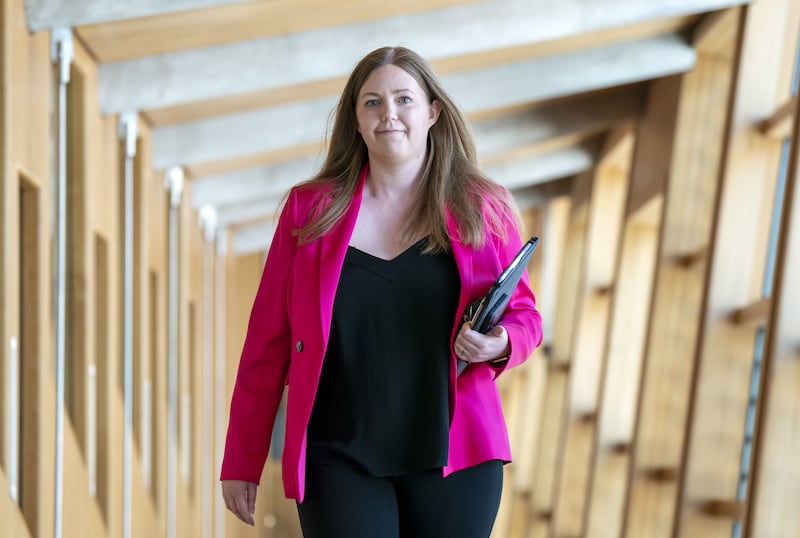A proposed law to ban protests outside abortion clinics is “necessary” to ensure women are free of intimidation, a Holyrood committee has said.
The Health, Social Care and Sport Committee has unanimously agreed to the general principles of the Abortion Services (Safe Access Zones) Bill proposed by Scottish Green MSP Gillian Mackay.
A report published by the committee on Monday considered the conflicting human rights arguments relevant to the Bill, but ultimately concluded they are “proportionate” to the legislation’s aims of ensuring women are able to safely access healthcare.
Committee MSPs acknowledged the concerns raised by opponents of the Bill who said the proposals threaten their freedom to express their views in public spaces.

MSPs also questioned why the Bill proposes a 200m safe access zone, instead of the 150m recommended by experts, with the exception of Queen Elizabeth University Hospital in Glasgow which might need the radius extended due to its layout.
During the evidence gathering process, the committee heard concerns that police may find it difficult to determine whether the law has been breached by those undertaking silent prayers.
MSPs also heard from doctors working at facilities offering abortion services, who raised concerns that protests outside premises could result in patients delaying or not accessing treatment, while women who had used the services reported anxiety.
The report states committee MSPs had a “difference of views” over the issue of silent prayers, with some suggesting it should be an explicit exemption to avoid the “criminalisation of private thoughts”.
Meanwhile, others said silent prayers “can still be intimidating” to those seeking abortion services. The committee therefore recommended the issue is discussed further at stage two.
The report went on to state that the Bill’s implementation should be subject to ongoing post-legislative scrutiny to ensure the restrictions remain proportionate.
It will now proceed through the Scottish Parliament to be voted on at stage one.
Clare Haughey, committee convener, said: “Our committee is united in backing the Abortion Services (Safe Access Zones) Bill.
“We recognise the strong views it has generated and that not all are in favour of its introduction.
“But ultimately we believe the creation of safe access zones around abortion services is necessary to enforce the principle that everyone should be able to access healthcare free from intimidation or harassment.
“We understand there are competing human rights at play, but we have concluded this Bill strikes an appropriate balance.
“We held extensive discussions on the issue of silent prayer and while some members felt this should be exempt from the provisions in this Bill, other members felt an exemption would fundamentally undermine its purpose and that silent prayer can be intimidating to those accessing services.
“This will need further consideration if the Bill proceeds to stage two.”
Ms Mackay said time will be taken to “reflect on the committee’s recommendations” ahead of the next stage of the parliamentary process to “help to ensure that this will be the strongest and most robust Bill it can be”.
She added: “Some of the testimonies and stories that we heard through the process have been really heart-breaking and harrowing. The impact on patients and staff has been devastating.
“Nobody should ever be targeted and harassed in that way, and especially not when they are accessing healthcare.
“Buffer zones are an important step in expanding reproductive rights in Scotland and this is a key milestone in delivering them. I hope that all MSPs take the same positive and constructive approach as the committee and vote for the Bill at Stage 1.”
Anti-abortion campaign group Right to Life UK said the Bill would create “the world’s most extreme buffer zone law in Scotland”.
Spokeswoman Catherine Robinson insisted polling showed the “vast majority” of Scots were opposed to this, stating “only 30% of the population in Scotland support the introduction of nationwide buffer zones around abortion clinics”.
She added: “This committee has totally ignored the overwhelming opposition to this Bill and instead is supporting the introduction of the world’s most extreme buffer zone law in Scotland.
“This legislation goes further than any buffer zone legislation in other jurisdictions, creating a larger buffer zone than anywhere else in the world and giving the Scottish Government powers to extend these zones without limit.”
Ms Robinson added: “Many women have been helped outside abortion clinics by pro-life volunteers who have provided them with practical support, which made it clear to them that they had another option other than going through with the abortion.
“The proposed law change would mean that the vital practical support provided by volunteers outside abortion clinics will be removed for women and many more lives would likely be lost to abortion.”








